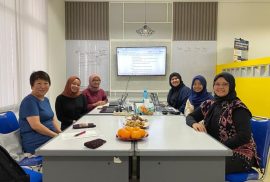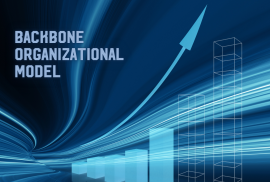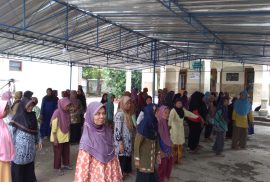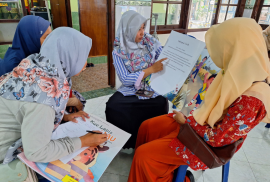The Center for Life-Span Development (CLSD) at the Faculty of Psychology, Universitas Gadjah Mada (UGM), welcomed Prof. Emiko Kashima from La Trobe University, Australia, from July 3 to July 10, 2024. Prof. Emiko Kashima’s visit is part of CLSD’s Visiting Professor Program to foster international research collaboration. The main objectives of this program are to establish partnerships and collaborative research with global partners, publish research manuscripts, and develop research proposals for submission to secure international funding in the coming years. The program was conducted at the Faculty of Psychology, Universitas Gadjah Mada, and led by Sutarimah Ampuni, S.Psi., M.Si., MPsych., Ph.D., Psikolog, as the Head of CLSD. The program also involved lead researchers Zahra Frida Intani, S.Psi., M.Psi., Psikolog, and Smita Dinakaramani, S.Psi., M.Psi., Psikolog, both lecturers at the Faculty of Psychology UGM, along with interns (student trainees) from CLSD.
sdgs
Yogyakarta, November 13, 2024— The Faculty of Psychology at Universitas Gadjah Mada (UGM) continues to demonstrate its commitment to supporting the achievement of the Sustainable Development Goals (SDGs) by researching the adaptation of financial well-being measurement tools. This research focuses on Indonesia’s growing middle class, which plays a critical role in national economic growth.
In a study on organizations, it was found that an organization is a complex institution with interconnected elements, such as mission, leadership, human resources, values, strategy, goals, performance, vision, structure, systems, skills, and time management. To better understand problems within organizations, this research developed and tested a practical method through the Backbone Organizational Model (BOM).
Islamic Psychology Study Group
The Indonesian society, which is predominantly Muslim, is already familiar with the term diseases of the heart. This concept originates from a verse in the Holy Quran, Surah Al-Baqarah, verse 10, which means: “In their hearts is a disease, and Allah increases their disease; and for them is a painful punishment because they [habitually] lie.” The heart referred to here is not the physical heart (liver), nor the cardiovascular organ (heart), but rather the spiritual heart, known as qolbu.
The Elderly Phase and Its Characteristics
The elderly phase begins at the age of 60, a period marked by shifts in social roles and often characterized by increased needs for health support. This phase has unique traits, such as emerging physical health issues, the potential loss of social roles, and intensive psychological adjustments. The growing elderly population, as seen in Indonesia today, reflects significant demographic changes and presents both challenges and opportunities to support elderly well-being and active participation in society. The elderly can provide valuable contributions through the life experiences and knowledge they have accumulated, while also facing challenges stemming from social, physical, and psychological changes related to aging. Therefore, understanding the social and psychological context of aging is crucial for supporting their sustainable well-being.
The event began with remarks from BKB representatives, followed by remarks from the moderator who was also a CLSD representative, Kevin Pasquella Helian, S.Psi. The event then continued with a speaker session by Navia Fathona Handayani, S.Psi., a literacy activist with extensive reading-aloud movement experience. The material presented includes an explanation of the importance of reading aloud, book elements that need to be considered when reading aloud, and a demonstration of the practice of reading aloud. Participants listened enthusiastically to understand various aspects of reading aloud taught by the speaker.
Next, the event involves dividing the trainees into four small groups. This agenda aims to apply the material that the presenter has previously taught. Two facilitators, Rahmita Laily Muhtadini, S.Psi., and Riskhi Pratama Kusuma Arum Jati, S.Psi., were tasked with guiding the dynamics of participants in small groups. In this process, participants are given time to choose a book by considering various elements such as theme, plot, setting, and story characters. Each participant then practices reading aloud in a small group. This process is very important to ensure that participants understand the concept of reading aloud not only in the realm of knowledge but also in the realm of skills.
The next agenda is a practice session reading aloud by participant representatives from each group. Apart from aiming to see the participants’ abilities after the training, this agenda is also designed for a joint evaluation process. Participants provide appreciation and input to fellow participants during the process of reading aloud in front of the class. The event closed by presenting certificates, door prizes, and group photos.
It is hoped that the entire series of events in this reading-aloud training can increase the sensitivity and abilities of BKB cadres and parents. It is also hoped that this event can build independence for the residents of Suronatan Village by spreading the spirit of literacy at home and in the community.
Source: CLSD UGM
Editor: Erna






